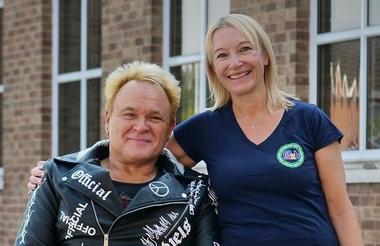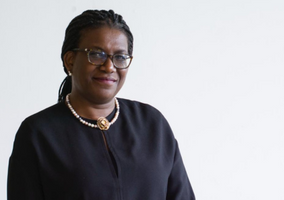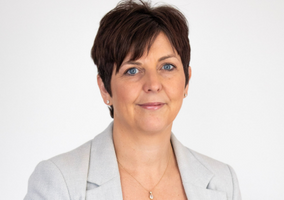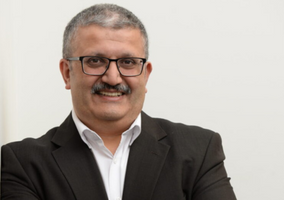Former television presenter Mik Scarlet has led Phab, a charity which organises a network of 150 clubs for disabled and non-disabled people, as its co-CEO for two years.
A wheelchair user himself, Scarlet has run the 67-year-old charity as its first disabled CEO alongside experienced sector leader Dawn Vickers, who has caring responsibilities.
Scarlet says the pair’s co-leadership model has caught the attention of other charities, who are interested to know whether it could work for them too.
“The one thing I keep hearing is there are lots of other charities watching how this is going, and how Phab is changing and how Dawn and I are doing as CEOs to say: ‘Let’s see if it’s possible.’
“This co-CEO model is quite a new thing. It’s got a complex way of working. We’ve come in like a whirling dervish, both of us.”
Journey to co-CEO
Scarlet has been disabled for almost all his life, having life-saving medical treatment as a baby which left him with a paralysed right leg.
After a spinal collapse injury as a result of the treatment, Scarlet became a full-time wheelchair user at 16. Shortly after this, he visited his local Phab club.
“When I was young and I became a wheelchair user full time, I lost all my friends. You always do when you’re ill – it doesn’t matter if you’re a kid or if you’re an adult. Whenever you’re really ill, your friends just disappear. So, I didn’t have any mates, I couldn’t do much, I was trapped in the house all day, my local youth club was up a flight of steps. Everywhere I went as a kid when I could walk became closed to me.
“So, I went to the local Phab club and it sort of set me on the path to doing everything that I did afterwards.”
Scarlet became a musician in the 1980s as lead singer of a band called Freak UK, which supported Gary Numan on a European tour.
While gigging, he was spotted by a TV producer on a stag do, which led to a career as a presenter on Channel 4 including on children’s show Beat That.
Scarlet also acted in programmes such as the Bill and Brookside and performed in the 2012 Paralympic opening ceremony before presenting coverage of wheelchair basketball at the event.
He also worked as a journalist and access and inclusion adviser before taking a managerial role at Network Rail.
Return to Phab
Scarlet became involved with Phab once again on a voluntary basis, initially reading a poem at a carol service before taking on an honorary role as vice president, “which meant that I turned up to parties and ate nice cake in the House of Lords once a year”. This then led to Scarlet applying for a paid position at the charity.
“I saw that they were looking for a CEO. And I thought ‘well, I know all about what I think they could be and I know I could do it so why don’t I apply’ thinking I had no chance because there’d be all these proper, skilled, excellent CEOs.
“And luckily, they said: ‘Do you want a job share? We’ve found someone that we think has got all of the previous experience, but you’ve got all of the kind of hopes for the future and disability equality stuff.’ So, we kind of ended up with a super CEO by putting the two together.”
Vickers previously worked in marketing and PR roles at various organisations in the education sector as well as co-founding Spring Into Action, a social enterprise for young people with physical and learning disabilities.
She has also been a managing director of learning disability inclusive arts charity DanceSyndrome and is a jazz singer and drummer.
Throughout her career, Vickers has also helped to care for her younger brother Craig, who has Down’s syndrome and autism, as his only sibling.
“Dawn is such a brilliant manager, so brilliant. I mean, we’ve got such a great team and they’re so passionate,” says Scarlet.
“It used to be a little bit micromanaged but now what we do is we kind of go ‘you’re the experts, you do it, we will be there to support you, if we can do anything we’ll help you’ and Dawn’s fantastic at that. I probably need a little bit more prodding in that direction. I’m a little bit of a control freak. I’ve been told don’t forget you have got to bring people with you.”
Scarlet says his and Vickers’ co-working relationship, in which they both work three and a half days a week, has developed over the past two years.
“The first year, we split everything down the middle and said, ‘right, I’ll do that, you do that and you do that and I’ll do that’. And so there wasn’t any demarcation and I think it became quite difficult for the staff to know who to contact and I think it made it quite stressful for everybody.
“So what we did was we had to rethink. And so now I have roles, but she has roles. All the staff are now really confident, they feel really secure. They know what they’re doing. And they also know that we trust them to do it. But we’re also there all the while.”
Scarlet says he usually responds to questions on things related to the charity’s imagery and long-term strategy while Vickers leads on finances and management.
Majority staffed by disabled people
Scarlet says his and Vickers’ appointments marked a change for Phab, which began in 1957 and registered as a charity in 1974, as it was previously led by singular, non-disabled CEOs.
“It’s been around for ages and it was run a bit like that, if you know what I mean. The last CEO was fantastic. But the board wanted people to come in who had a vision for the future, rather than ‘let’s keep things going the way they are’. And I think that’s what happened.”
He says the leading Phab was “unlike anything I’d ever done” and challenged some of his previous preconceptions about the charity sector.
“I used to be quite anti-charity because it’s a disability equality thing, the way you’re portrayed and the way that charities around disability don’t tend to be run by us. But then I thought, well, that would be a huge change in one step if I became a CEO of a charity about disability, and I was the kind of person that they’re supporting, as opposed to the kind of person who likes supporting people like me.”
Since being appointed, Scarlet and Vickers have focused on making Phab more representative of its beneficiaries as well, by increasing its proportion of disabled staff.
Scarlet says this has been driven by Phab’s employment of freelancers to work on its access consultancy and training services project, whereby the charity’s representatives advise other organisations on their accessibility, but the charity also employs disabled people in its core staff.
They are considering trying to register the charity as a disabled people’s organisation, which would require 75% of its board to be made up of disabled people and 50% of its workforce.
“The whole direction for any charity that has anything to do with disability is it should be run, and at least 50% staffed, by disabled people. Because if nothing else, it should really be that we get employed in the things that are to do with us,” says Scarlet.
“One of the great joys of working at Phab is really embedding that. There were quite a few disabled people working there but now we’re really going for it. And we’re not employing people because they’re disabled; we’re employing them because they’re the best people for the job.
“But once you start telling people you will be supported and you’ll get reasonable adjustments, and you’ll get a place where it’s about output and not about hours sat at a computer, then you end up with people going ‘I can apply for this’.”
This has coincided with Phab switching to remote working – the charity is in the process of selling its Croydon office – with the charity’s seven paid staff meeting fortnightly online. Scarlet says the remote arrangement suits Phab’s employees now, who are based across the country.
“We went from being office-based to being virtual. During Covid, we had to and then we realised that we’ve got a great big office space that we don’t really need. So, we’re selling that, which allows us to have a proper sinking fund and also be able to invest the money so that we’ve got a future.
“The whole thing about Covid was that it made it very dodgy for loads of charities because the income went way down, but also what we did got so squashed. It’s quite hard to keep a profile when everybody is staying indoors.”
Phab’s income fluctuated during the pandemic from over £1m in the year to March 2019 to less than half that in 2021-22. It recovered to £644,000 in 2022-23 and Scarlet hopes to increase it further in the coming years, possibly by generating profits through the consultancy project.
Some charities ‘ahead of the curve’
From his experience as an adviser, Scarlet says some civil society organisations with which he has worked are “at the forefront of inclusive practice”.
He lists arts commissioning charity Unlimited, theatre charity Graeae and social enterprise CRIPtic Arts as being “way ahead of the curve”.
“And then there are others that are less so or there are others that possibly might be quite vocal in campaigning, but not quite so good at doing the stuff that they’re talking about.”
He says that some leaders have shown resistance to the disability movement but have been convinced after its aims have been explained to them.
Scarlet adds: “The disability rights movement’s saying used to be ‘nothing about us without us’ and there’s a new movement within the younger people who say surely shouldn’t it be ‘nothing without us’. What’s not about us? Everything is, because we are the biggest minority in any community.”
Related Articles












